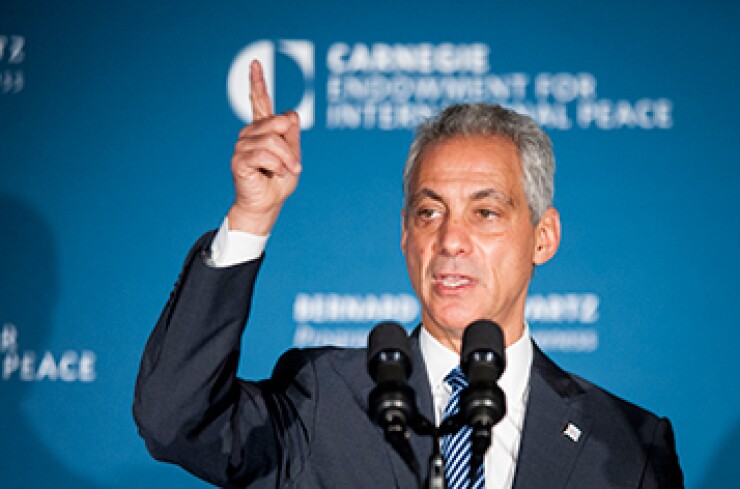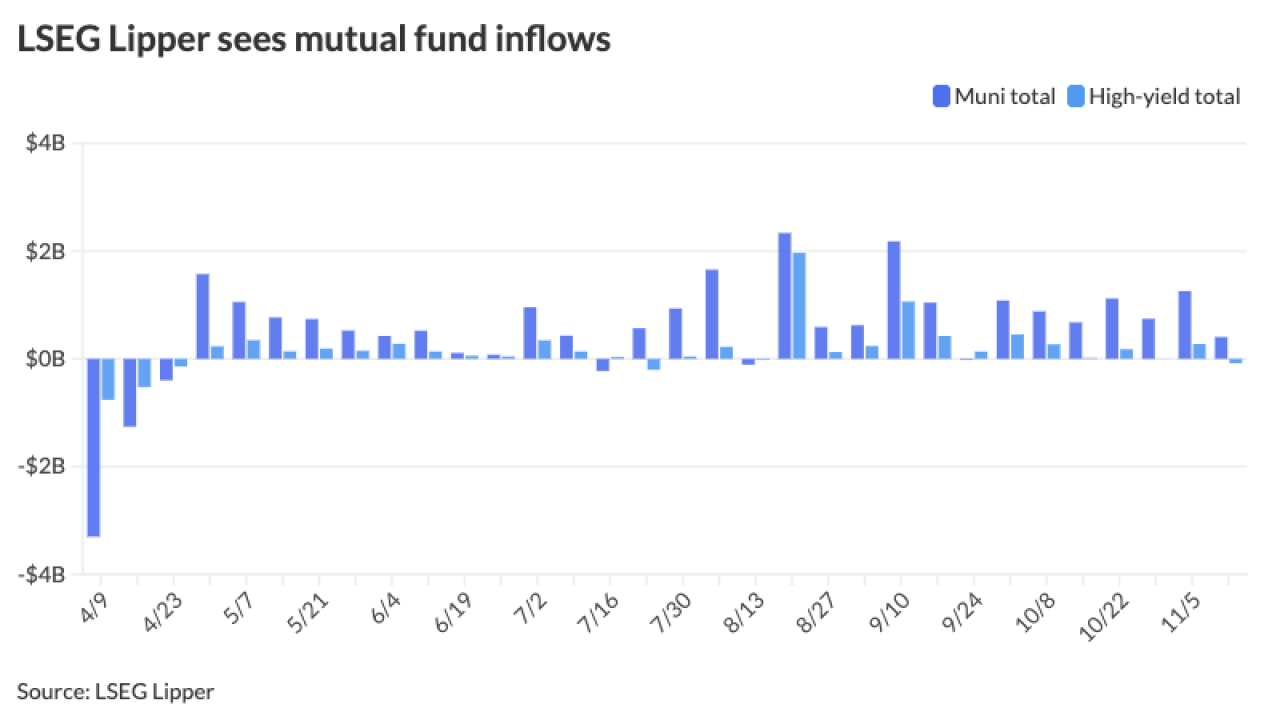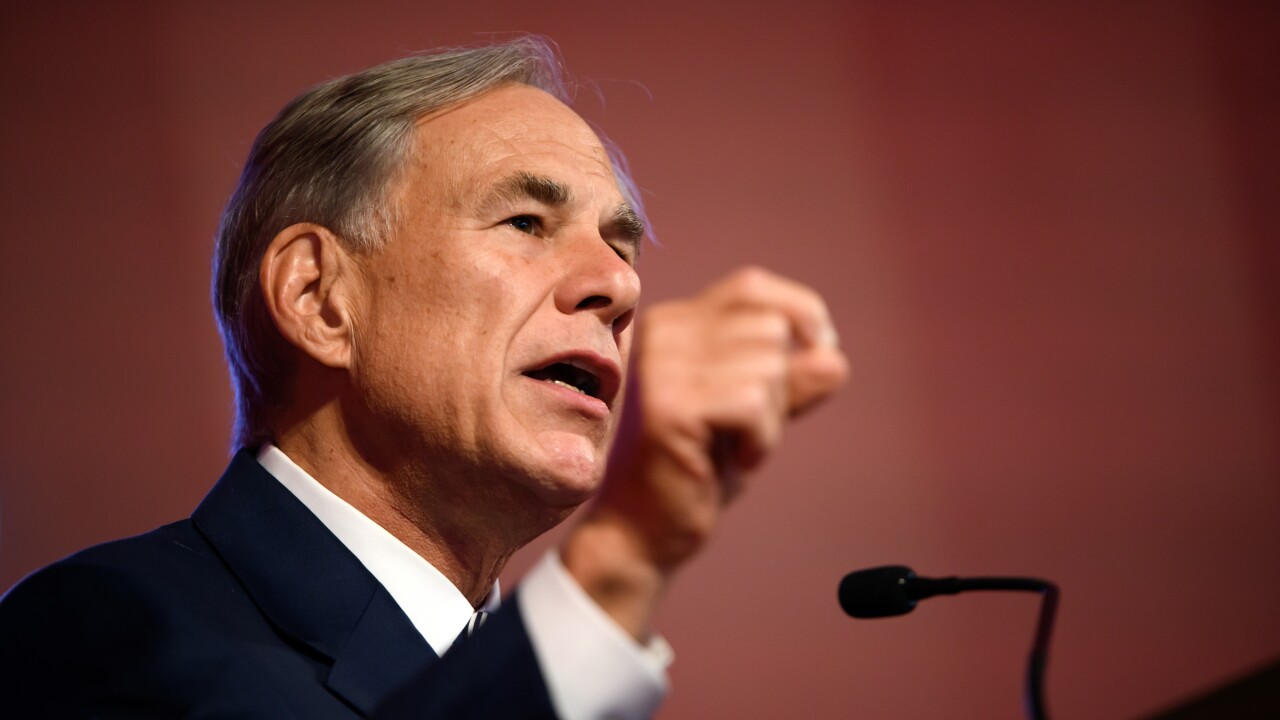
CHICAGO – The financial crises in Chicago and Illinois might have to get worse before they get better, experts told the National Federation of Municipal Analysts.
"The state of Illinois' fiscal crisis is really bearing down on Mayor Emanuel and Chicago Public Schools," Laurence Msall, president of the Chicago Civic Federation, said during the opening session of the NFMA's annual conference in Chicago.
Wednesday's panel followed a keynote address from Mayor Rahm Emanuel.
With any state-level action to support the city and the Chicago Public Schools caught in the crosshairs of the state's bitterly partisan budget stalemate, a deeper crisis may provide the only means out, the panelists said during a discussion Wednesday about the politics behind the city, school district, and state's persistent pension and budget strains.
The city, CPS, and Illinois have kept analysts busy as they grapple with varying degrees of fiscal stress driven in large part by poor past political decisions and now, to some degree, political dysfunction.
"Because we don't have a state budget the state legislature is not taking up, in a serious manner, any of the real issues," Msall said.
Potential cuts in the level of income tax revenue shared with local governments remain uncertain as do potential public safety pension reforms.
For Chicago and CPS the pain is especially acute. Legislation that would re-amortize the city's public safety pension payment schedule, trimming $220 million off the additional $550 million that's owed this year under a 2010 state mandate, is in limbo, sitting on Gov. Bruce Rauner's desk.
He's threatened a veto but suggested he would support it if he gets policy and governance reforms. The city has $20 billion of unfunded pension liabilities and is rated junk by Moody's Investors Service.
The severely distressed CPS, rated junk by three of four rating agencies as it grapples with a $1.1 billion deficit and nearly $10 billion of unfunded obligations, remains afloat only through expensive short-term borrowing.
Its 2016 budget assumed $480 million of additional state help that has yet to appear.
Democratic allies in the legislature have floated several proposals to help the district, including overhauling how state aid is distributed. That measure stalled Wednesday with minority Republicans labeling the revised formula a bailout.
The district also wants the state to cover its share of teachers' pension payments as it does for other districts. Rauner, a Republican, has warned there will be no bailout for the schools but has offered up some additional help, again, if Democrats get behind his policy proposals.
While the Illinois Supreme Court has shot down state laws to overhaul pensions for state government and Chicago workers, some believe a constitutional amendment should go to voters clarifying or limiting the state constitution's pension clause to provide pension relief. But such a measure has not gained traction.
"Even getting that kind of discussion in Springfield in a serious manner is difficult when everything is tied to the budget and the budget is tied to everything," Msall said.
Chicago has more independence as a home rule city with diverse revenues streams, allowing Mayor Rahm Emanuel to push through a record $543 million annual property tax hike last year to fund pension contributions.
CPS lacks much flexibility because its property tax levy is limited by state caps and its other primary source of funding comes from the state.
"They are not masters of their own destiny," due to the district's dependence on the state and the power of its Chicago Teachers Union, said panelist Kate Grossman, director of fellowships at the University of Chicago Institute of Politics.
As the state's budget stalemate progresses, its unpaid bill backlog could hit a record $12 billion high at the close of fiscal 2016 on June 30.
The Commission on Government Forecasting and Accountability reported this week that state revenues are down nearly $5 billion through April due to a drop in income tax collection that followed the 2015 partial expiration of its 2011 income tax hike.
Illinois, the lowest rated state, has more than $100 billion in unfunded pension obligations and this year is on track to spend more than $36 billion in its general fund while it only expects to take in $32 billion.
Rauner and the General Assembly's Democratic majorities remain at loggerheads, with Rauner refusing to back tax hikes Democrats want as part of a budget fix unless they drop their opposition to some of his governance and policy reforms.
"This is the worst way to run a state….because there is no management" of large portions of state spending, Msall said. State spending continues unchecked under consent agreements, court orders and in some cases -- like the state's general obligation debt – through continuing appropriations.
The federation slammed Rauner's fiscal 2017 budget proposal in a report this week, warning that it falls as much as $5 billion short, relies on one-time revenues and savings from measures that may not materialize.
Political solutions may only come if the crises get worse.
Otherwise, political leaders will just continue to "duck" the tough solutions, said panelist Greg Hinz, a Crain's Chicago Business political columnist.
CPS is closest to a tipping point, with questions raised about its ability to access the market again after its yields hit a high of 8.5% in a deal earlier this year.
State law imposes a 9 % limit on interest rates.
Issues that could finally drive a solution include banks halting access to credit lines, the district's inability to meet payroll, or a teachers' strike, panelists said.
In response to questions over the prospects that CPS could land in bankruptcy as Rauner has suggested, the panelists suggested there was little chance that Democratic leaders would allow legislation to pass putting a Chapter 9 statute on state books.
"I will not rest until we fix the fiscal position of both the city and CPS," Emanuel told the analysts in his speech. The mayor appoints Chicago's Board of Education.
Emanuel highlighted the city's efforts to tackle pension liabilities. "We finally came to terms with the cost those pensions," he said of his administration's efforts since taking office in 2011.
He highlighted what he described as strides that have been recognized by investor and rating agency analysts, led by a sharp reduction in the more than $600 million structural deficit he inherited and a halt to use of reserves for operations.
He has also pledged to eliminate poor debt practices like scoop-and-toss bond refundings and the use of debt to cover operating costs, tactics he inherited and continued to use during his first term.
On the high court's pension rulings, he said: "I think they've put in my view a straightjacket on us. And we are back at the table [with the municipal and laborers' unions]."
But his stuck with his position that a solution lies in protecting pension fund members' rights "but in a way that is responsible for our taxpayers."
That falls short of what several analysts said they had hoped to hear from the city on the pension front after the high court's rulings hardened the path against benefit reforms. Several said the analysts' community is hungry for more detail including how the city will deal with the additional $220 million payment if it doesn't get the state bill to re-amortize public safety pension funding.





